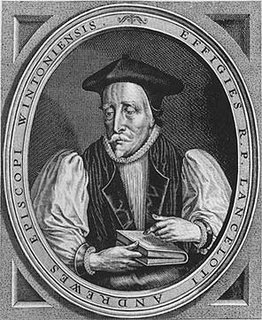Feast Day of Lancelot Andrewes

Today commemorates the death of one of my favorite English preachers--Lancelot Andrewes. Along with John Donne, he represents that generation of gifted orators and biblical scholars who flourished in their youth under Queen Elizabeth and came to full flower under King James I. Andrewes was not only quite learned (he supervised the translation of a goodly chunk of the Old Testament for the Authorized Version of 1611), he was also extraordinarily pious. It is reported that when he died the Liturgy of the Hours that he had compiled (based on his own original research of the Patristic Fathers) was covered with his own "blubbered tears." This rare combination of piety and scholarship has always been something of a model I have at least aspired towards.
I thought of Andrewes this morning during the scripture lesson at Morning Prayer. We have been making our way, rather slowly, through Paul's Epistle to the Romans and are (finally) nearing the end. While I know that understanding Paul's argument in Romans has been crucial over the centuries to reform (Martin Luther and Karl Barth, to name a couple), when heard in this lectio continua (the book read in sections from beginning to end) format he can start to grate on one's ears. Now that he is in the paranesis ("ethical admonition") section, I am hearing his admonitions with fresh ears. For instance, today was, "whatever does not proceed from faith is sin." This, as a closing comment, to his discussion about one's eating and drinking habits.
This suggests a rather holistic understanding of faith as something that permeates all of one's life. Again, Andrewes seems to fit such a bill. When others were either consigning faith to an intellectual concept or as something to which one simply "conformed," this great metaphysical preacher insisted that it should infuse all of one's being. I think he would have agreed with Olver Wendell Holmes, whose hymn we sang:
"Grant us thy truth to make us free, and kindling hearts that burn for thee;
Till all thy living altars claim one holy light, one heavenly flame."


<< Home